- Home
- Terri Blackstock
True Light Page 4
True Light Read online
Page 4
The room was lit only by its windows, but Doug spotted the Emorys sitting in a corner.
Ellen — Zach’s mother — looked as if she’d been in mourning since long before her son was shot. Jeff had occasionally spoken of Zach’s mother as if she were crazy. One minute she was screaming at everyone in her family, the next she was so depressed that she couldn’t get out of bed. “It’s like she’s given up,” he’d said a week ago. “I really think she’s losing it.”
She got up when she saw them coming and hugged Jeff as if he were part of the family. “He’s alive,” she said. “They’ve got him in surgery.”
Gary Emory, Zach’s brother, paced back and forth across the waiting room — back and forth, back and forth — as if slowing down or sitting for a moment might mean letting go of his brother. “He was shot right through the chest. They said he couldn’t breathe.”
Doug’s heart sank. He prayed they could still use the equipment they needed to save Zach. Though they could provide electricity to this vital place, X-rays, MRIs, and CT scans would still be out of the question. Any sensitive equipment too high-tech to withstand the frequent gamma-ray pulses emitted from the supernova would still be useless.
“I know why you’re here,” Ned said, leaning against the wall and looking at Doug. He seemed stunned, shell shocked, as if the news of his boy’s injury was still circulating in his head, trying to find a place to rest. “You’re here because you think we need a preacher, and the truth is, we do.”
Ellen shot him a look. “Speak for yourself, Ned. I don’t need one.”
“Then who’s gonna bury Zach if he dies?” Ned’s words whiplashed across the room, and Ellen recoiled as if they had struck her in the face.
“He’s not gonna die!” She stuck her chin out, lips tight over her teeth. “Why do you say things like that, like you want it to happen? Are you trying to set me off? Do you want me to put my fist through your face?”
Doug hadn’t expected to hear such a threat from a woman who weighed about one hundred pounds and looked as delicate as a cracked reed. But there was fire in her eyes, and Doug didn’t doubt she would do it.
“I wasn’t trying to set you off, Ellen, so stop with the dramatics,” Ned returned. “For once it’s not about you!”
“It’s never about me!” she shouted. “I’m surprised you even came.”
Doug glanced at Jeff, who looked as if he’d seen this behavior before.
“You’ll probably be back at work before Zach even stops bleeding!” Ellen said.
“I’m here, aren’t I? Nothing’s ever good enough for you!”
“Could you two shut up?” Their son’s demand cut through their ire, silencing them.
The others in the waiting room began to applaud. Despite Doug’s surprise that Gary had talked to his parents that way, he wanted to join in.
Jeff turned his back to the Emorys and whispered, “Dad, she’s crazy. Let me handle this.”
Doug couldn’t imagine what Jeff could do, but his son turned and approached the feuding parents. “Was Zach awake when they got him here?”
Ellen shot a threatening look to those who had just applauded, then sank back onto a vinyl chair. Her voice was low when she answered. “He was in and out of consciousness, but gasping for breath.”
Doug wished Kay were with him so she could comfort Ellen somehow. He’d do it himself, but he feared losing an eye if he reached for her.
“They’re able to run ventilators,” Ned said. “So he’ll have help breathing.”
Finally, some good news. “Will you get to stay with him?” Doug asked.
Gary nodded. “One of us at a time.”
“I’ll help,” Jeff said. “I’ll tell all the guys. We can take turns sitting with him around the clock. Just say the word.”
Ellen’s face softened. “Thank you, Jeff. You’re a good boy.” As if that declaration crushed her, she melted into tears.
For a moment, everyone was awkwardly quiet.
Finally, Gary spoke up. “Is anybody talking about who did this?” he asked Jeff. “Surely somebody knows. Somebody saw something.”
“I haven’t heard any rumors,” Jeff said. “But we came almost as soon as we heard.”
“It shouldn’t be that hard to figure out,” Doug said. “Whoever it was came home with a deer.”
“What?” Ned asked. “What do you mean?”
Doug realized they hadn’t been told much yet. He wondered if he should wait and let the sheriff deliver the news.
But Jeff spoke up. “I heard Zach had just shot a deer, and whoever shot him took it.”
Ellen gasped, and Ned spun around to Gary. “Did you know this?”
Gary’s nostrils flared, and his eyes flashed. “No, Dad. I ran for help as soon as I saw him laying there. There was no deer. They must have already taken it.”
“My son was shot for deer meat?” Ellen shrieked, turning to her son. “How long did it take you to get to him?”
Gary looked sick. “I had one in my sights myself, so I waited a few minutes. I figured he’d shot one, but I didn’t think it was an emergency. I would’ve gone if I knew he was shot!” Gary’s voice broke and he turned away, hiding tears. Jeff slid his hands into his pockets and looked at the floor. But Doug watched as Ellen took several angry strides toward her son. He braced himself, expecting her to attack Gary. But she surprised him again and took her firstborn into her arms. He clung to her and wept. After a moment, Ned joined their embrace.
Doug set his arm around Jeff’s shoulder, feeling his son’s struggle to hold his emotions.
“He’s gonna make it, Dad,” Jeff whispered. “I know he is. He has to.”
Doug looked past him to the hallway outside the waiting room, where other wounded or sick people were lined up on gurneys, waiting for the operating room. Thankfully, Zach had been moved to the front of the line. Doug supposed a bullet in the chest warranted emergency treatment.
“It’s out of our hands now,” he said to the Emorys. “All we can do is pray and wait. But I know from experience that God answers prayer. Will you let us pray with you?”
Ellen tightened again. “I don’t believe in God, so do your praying somewhere else.”
“Mom . . .” Gary said. “You don’t have to be a jerk about it.”
Ned rubbed his jaw. “I don’t know what I believe, but I’ll accept your prayers, Doug. They sure can’t hurt.”
Doug hadn’t been in his preaching role for very long — only eight months, since the Pulses began and he’d started a church in their home. He’d never been comfortable in situations like this, especially when the family had shunned his efforts to invite them to church. He wondered if Ellen’s and Ned’s attitudes toward God had anything to do with the fact that he’d forbidden Jeff to hang around with Zach in the past couple of years. The boy had seemed like a bad influence for Jeff, and Ellen’s behavior just now reinforced that.
He was glad that over the last three or four months he had let Zach come around more often. And Doug hadn’t tried to stand in the way when Jeff and Zach started a band. The boys needed a diversion, and that was as good as any.
But now he wished he’d been more caring toward the family. He bowed his head and began to pray aloud for Zach, knowing that God heard his prayers whether Zach’s family were believers or not. He prayed for miraculous intervention, and for God to give the Emorys peace and comfort. Then he asked God to lead the authorities to the one who’d done this.
When Doug opened his eyes, Ellen’s cold eyes were fixed on the wall. “If they find the guy who did this,” she said, “I’ll make sure he doesn’t live to brag about it.”
Doug cleared his throat and remembered his own declarations of vengeance when Deni had turned up missing. He couldn’t say he blamed her.
EIGHT
IT WAS A TERRIBLE DAY FOR A SWAP MEET, BUT KAY COULDN’T back out now. Despite the snow beginning to blanket the ground and the 28-degree cold — and the terrible news they’d gotten ab
out Zach — she had managed to get a wagonload of goods to the tent. She hoped she’d trade it all, because she sure didn’t want to borrow a horse and wagon again to take it back home.
The swap meet was held every month on the playground behind Crockett Elementary. It was a way for people to trade for things they needed. Since anything other than food was considered a luxury, no one had the means to purchase birthday gifts or clothes or shoes . . . or anything else.
The swap meet tents were always full of baby furniture, clothes, and toys, and young parents looked for necessities for new babies and growing toddlers. Kay hoped she could trade for some bags of flour and baking soda. She also hoped to find some presents for Doug’s birthday tomorrow. She had brought all of her children’s outgrown clothes, a tub of shoes that weren’t being worn, some blankets she’d made, some old curtains, and a number of other items she hoped someone wanted. She’d also used her makeshift solar oven to bake twenty loaves of bread, with which she hoped to buy food from local farmers in a nearby tent.
Logan, her nine-year-old son, had brought his own box of stuff. She watched as he unloaded it onto their table: there were several action figures, a Rubik’s Cube, some soccer shin guards, an old bicycle helmet, and some things she couldn’t identify.
He pulled out a wooden ball with sticks coming out of it, each with a smaller ball on the end. She picked it up. “Logan, what’s this?”
Logan took it from her and grinned. “It’s my molecule. I made it for science class last year.”
She remembered then — he’d spent hours drilling holes into the wooden ball made for a banister. “And you think somebody’ll trade for it?”
“Sure. Look at it. Who wouldn’t want this?”
It would have been funny on any other day, but her heart was too heavy for amusement now. The news about Zach had made it hard to focus.
Logan spotted something across the tent. “Cool, a parachute! I’m gonna see if I can get it.”
“Logan, we need flour, not parachutes. And don’t you want to get your dad a present?”
“Dad would love a parachute, Mom. Besides, I have plenty of stuff to trade.”
“But what would you use it for? I don’t want you jumping off anything.”
“Mom, get real. You can do a million things with it. It’s fun just to have!”
She sighed and hoped they wouldn’t be interested in trading for a molecule.
“Terrible about Zach, huh?”
Kay turned and saw Mark Green’s mother Martha setting up next to her.
“Yeah, really terrible. I sure hope he pulls through.”
Martha’s black hair had grown long enough to wear in a ponytail. With her petite frame, she looked years younger than she was. And Martha didn’t have the gray stripe Kay had at her roots. Kay tried not to envy her.
“Have you heard any details?” Martha asked.
“Not really.”
“Who would do that?” Martha shook her head and sighed. “I’m telling you, it’s a dark world.”
Martha knew of what she spoke. She had once been married to a psychopath. He was dead now, but he’d been the bane of her existence for much of her adult life. The trials had made her stronger. Kay supposed she deserved to have great hair, after all she’d been through.
“This is the first one of these I’ve been to,” Martha said as she unloaded her boxes of solar panels Mark had built. “Tell me how it works. If someone wants one of these, but they don’t have anything I want, what do I do?”
“You take it to the uneven-trade table, where they’ll assign you some tokens for the value of your item. Then you can spend them on other items at that table.”
“Sounds complicated.”
Kay laughed. “It is. Trade even if you can. But the farmers do set up at those tables, so if you need flour like I do, you have no choice but to go there.”
Kay’s eyes drifted to Logan, negotiating for the parachute. Thankfully, the owners didn’t seem to want his dirty shin guards or his science project. Looking discouraged, he started back toward her — but then he spotted a litter of cocker spaniel puppies, and hope filled his eyes again. “Score!” he shouted.
“Logan, no animals!” she called over the crowd.
But he didn’t hear her. He made a beeline toward the puppies, brandishing his useless currency. He was going to drive her crazy before the day was over.
NINE
DENI BRANNING STOOD OVER THE PRINTING PRESS AT THE office of the Crockett Times, watching Harriet Campbell set the movable type so she could print Deni’s story about the shooting for the next issue. “Too bad we can’t wait to hear about Zach’s prognosis,” Harriet said as she worked. Her breath fogged in the dimly lit room. They’d managed to get the press set up, but getting any kind of stove or fireplace into the small building was a luxury they couldn’t yet afford.
“Wish we could get the paper out every day instead of just once a week,” Deni said.
“Well, with your updates on the message boards around town, we can keep the people informed.”
Months ago, when Deni had first decided to be the self-proclaimed journalist for her little community, she’d started the Crockett Community Journal, a big name for such a small undertaking. Since she didn’t have the benefit of computers and Xerox machines, she’d had to handwrite her stories and stick them up on the literal message boards posted in neighborhoods all over town. Those boards, which were covered with notes, for-sale signs, and other scribbled communications, had become the area’s source for all their news.
Then back in November, Harriet Campbell had shown up at Deni’s door and asked if she’d like a job. Harriet had bought an old-time printing press that didn’t rely on electricity, and she was ready to get the Crockett Times up and running again. She’d been impressed by Deni’s news items on the message boards and decided she’d be an asset to her little newspaper.
Deni had jumped at the chance. She had dissolved her little journal and merged forces with the Crockett Times. This was something she could actually use on a résumé someday, and the printed paper, which could be delivered to homes around town, looked much more professional than what she could produce with a manual typewriter and carbon paper. But it was time-consuming setting each letter by hand. Fortunately, Harriet’s husband and children helped so that Deni was able to be a field reporter most of the time.
“I just went by the sheriff’s department on the way home from the site of the shooting,” Deni told her, “and people are already starting to show up naming men who brought deer home this morning.”
Harriet looked up at her. “Can I include them in the article?”
“No, better not,” Deni said. “Only one is guilty — and I don’t want to smear anyone’s reputation if they didn’t do anything wrong.” She shoved her hands into her pockets and started for the door. “But I’m going now to interview some of them. And I’ll let you know as soon as my brother and dad get back with news of Zach’s condition.”
She pushed out the door into the cold and looked around at the snow already blanketing the street. She’d always loved snow before, but she dreaded it now. This area didn’t have snow every year — so why did they have to have it this year? With no heat, people would die. Not everyone had a fireplace, and many hadn’t been able to purchase stoves to help keep their homes warm. She worried about the people in the apartments around town. Many of the residents had died of typhoid, dysentery, and other diseases from the backed-up sewage. Others had left the apartments and migrated to places where living was a little easier — near lakes or farmland. Those who remained were trying to work together to survive. But living without air conditioning in summer was a lot easier than living without heat in freezing weather.
At least the government had used some of their working and revamped car engines to haul tanker trucks full of water to areas where there weren’t any wells. This had lowered the mortality rate among the apartment dwellers. Though the tankers were never replaced as soo
n as the water ran out, still, it had helped the quality of life for so many. News from up north told of thousands dying this winter. The hospitals that were open overflowed with people with contagious diseases and bacterial infections. Deni hoped her dad and Jeff weren’t exposed to anything while they were checking on Zach, and that Zach wouldn’t develop a staph infection — something that had emerged as a killer of many after serious wounds.
That morning’s interviews of the men who’d been first on the scene after Zach’s shooting had left Deni feeling, once again, as if life balanced on a thin fulcrum, ready to tip and crash at any moment. Never in her twenty-two years had she been more aware of the fragility of life than she had been these last few months, and Zach’s shooting hammered that home.
Sheriff Scarbrough had given her little in the way of comments for the paper, but his suggestion to ask people if they’d seen anyone coming home with a deer this morning had been a good one. She’d had Harriet print up a sheet to put on the message boards around town earlier today. The top half gave the news of Zach’s shooting and the known circumstances. Below that, she’d written:
CAN YOU HELP FIND ZACH EMORY’S SHOOTER?
If you know of anyone who came home with a deer this morning, February 4, report it to the sheriff immediately.
It hadn’t taken long for people to start talking, and before she’d gotten the paper tacked up on all of the boards, she’d started getting names.
But there was one name on the list that she’d rather not see — Mark Green.
She stopped her bike and wrapped her scarf more firmly around her face to keep the bitter wind from chapping her skin. She doubted that Mark knew he was on the list of possible suspects. The idea of his having anything to do with shooting Zach was so preposterous that she couldn’t even consider it. Yet the neighbors would. His dead father had been sinister and violent, and no one would forget that. The mere hint that he might be responsible would send the neighborhood into a panic.

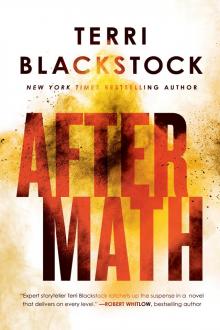 Aftermath
Aftermath Shadow of Doubt
Shadow of Doubt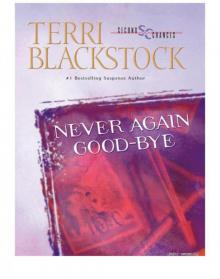 Second Chance - 05 - Never Again Good-Bye
Second Chance - 05 - Never Again Good-Bye Miracles
Miracles Broken Wings
Broken Wings the Cape Refuge (Cape Refuge Series Book 1)
the Cape Refuge (Cape Refuge Series Book 1) Shadow in Serenity
Shadow in Serenity Distortion (Moonlighters Series)
Distortion (Moonlighters Series) Second Chance - 02 - When Dreams Cross
Second Chance - 02 - When Dreams Cross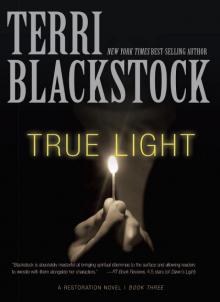 True Light
True Light Private Justice
Private Justice Last Light
Last Light Downfall (An Intervention Novel)
Downfall (An Intervention Novel) Distortion: Moonlighters Series: Book Two
Distortion: Moonlighters Series: Book Two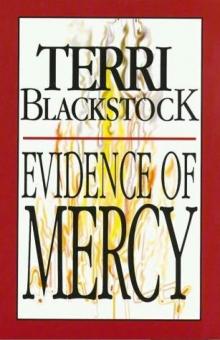 Evidence of Mercy
Evidence of Mercy If I Run
If I Run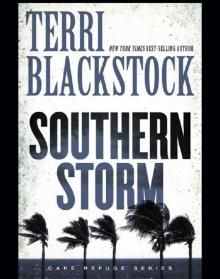 Southern Storm
Southern Storm Ulterior Motives
Ulterior Motives Emerald Windows
Emerald Windows River's Edge
River's Edge Intervention
Intervention The Heart Reader
The Heart Reader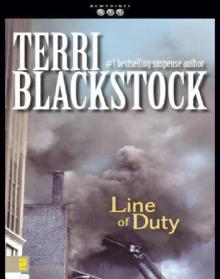 Line of Duty
Line of Duty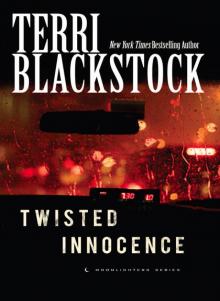 Twisted Innocence
Twisted Innocence When Dreams Cross
When Dreams Cross Downfall
Downfall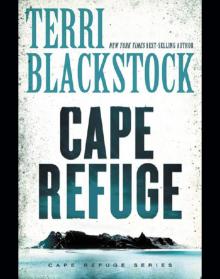 Cape Refuge
Cape Refuge Breaker's Reef
Breaker's Reef Night Light
Night Light Double Minds
Double Minds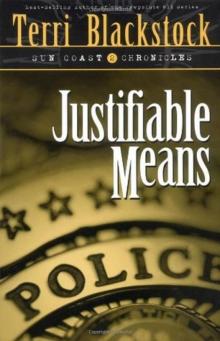 Justifiable Means
Justifiable Means Covenant Child
Covenant Child If I Live
If I Live If I'm Found
If I'm Found Vicious Cycle
Vicious Cycle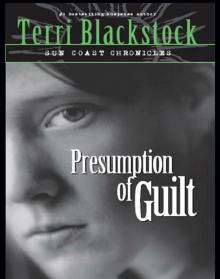 Presumption of Guilt
Presumption of Guilt Trial by Fire
Trial by Fire Word of Honor
Word of Honor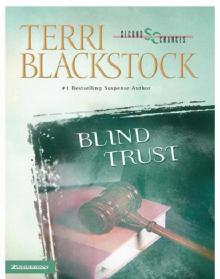 Second Chance - 03 - Blind Trust
Second Chance - 03 - Blind Trust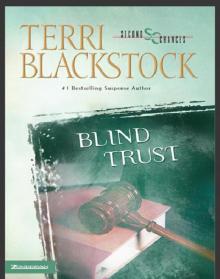 Blind Trust
Blind Trust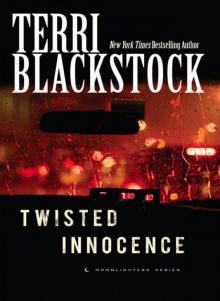 Twisted Innocence (Moonlighters Series Book 3)
Twisted Innocence (Moonlighters Series Book 3) Predator
Predator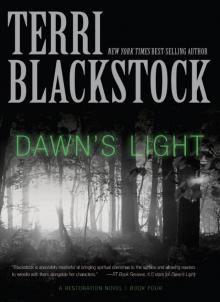 Dawn's Light
Dawn's Light Chance of Loving You
Chance of Loving You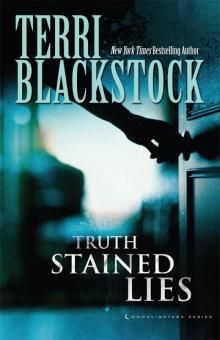 Truth-Stained Lies
Truth-Stained Lies Never Again Good-Bye
Never Again Good-Bye Catching Christmas
Catching Christmas